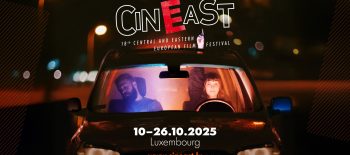20.05.2016 - 21.05.2016
Music
Jacek ANTCZAK interviews Piotr DAMASIEWICZ, a jazzman from Wrocław in the framework of the Brussels Jazz Marathon
European Jazz Unit 2016, with the participation of Piotr Damasiewicz, plays at Brussels Jazz Marathon on 20 and 21 May !
>>> more information HERE
Jazz is about honesty and understanding music. Jacek Antczak (reporter with Radio Wrocław Culture) interviews Piotr Damasiewicz, a jazzman from Wrocław.
| Jacek ANTCZAK | At the Brussels Jazz Marathon, you will represent Poland in the international band ‘European Jazz Unit 2016’. Is jazz such a universal language that it allows musicians to understand one another regardless of where they come from? |
| Piotr DAMASIEWICZ | Yes, that’s right – jazz is a language based on the foundations with which all artists are familiar, and it’s enriched by musical threads from the different parts of the world where artists come from. Through jazz, we are able to understand one another regardless of linguistic, cultural and political differences. Jazz music can draw on an extraordinary stock of resources. It can be abstract and evoke emotions at the same time. The language of jazz emotions can be easily picked up on by the public. If someone learned how to master scales and chords and studied the form of older songs, for example old Broadway songs, he would be able to understand others perfectly, irrespective of their musical dialect. |
| When one listens to your dialect, is it easy to place your music in this part of Europe, i.e. Poland? |
| Probably, yes. In Poland we have an outstanding jazz foundation, from Krzysztof Komeda to Zbigniew Siefert, Michał Urbaniak, Tomasz Stańko, Zbigniew Namysłowski and Tomasz Szukalski. In my latest project I refer to Szukalski. They are all great musicians and they are famous all around the world. |
| Let’s explore this a little further. Can you hear that you are from Wrocław, European Capital of Culture 2016? From this jazz city which has, for 52 years now, played host to one of the oldest European jazz festivals (Jazz on the Odra) and which not so long ago celebrated World Jazz Day with your composition ‘Improvisation by 26 musicians’. Where were they from? |
| We had jazzmen from Denmark, Belgium, Luxembourg, Germany, Ireland and Estonia. After the final concert at World Jazz Day, we gathered in a club with musicians from concerts in the National Music Forum. Suddenly, jazzmen from different parts of the city, from Century Hall, where thousands of people were listening to jazz, and from other clubs and halls with sold-out concerts, started coming to us. What happened was that in the same place at the same time, people from the very broad Polish jazz scene met in a small club. These things happen very often in Wrocław, not only during the year of European Capital of Culture or during the legendary Jazz on the Odra and Jazztopad festivals, which, incidentally, will take place this year in the United States as well. I invite everybody to come and listen to jazz in Wrocław. |
| There is one Pole who represents Polish culture for everyone. . In 2012, you were awarded the most prestigious music prize going in our country (Poland) – the Fryderyk for your first album Hadrony.. I wasn’t aware that Chopin was a jazzman? |
| I wouldn’t put it like that, but we Slavs are very receptive to Romantism, in our culture and music. Also, jazzmen occasionally play Chopin. I once performed mazurkas and a revolutionary etude with a jazz quartet at the Polish Institute in Vienna during Chopin year 2010. It was a truly delightful event and a great musical challenge. |
| Your first album received awards and then your career really took off. Have you found your place in life and jazz? |
| I always had a vision of what I wanted to play. Hadrony showed how my mind works when it comes to melody and the emotional scope of my music. And it developed: my albums Alaman, Imprograohic and Mnemotaksja were released after that. I love to create big bands. This stems from my idea of uniting people from different jazz environments. In my orchestra Power of the Horns I featured both mainstream and avant-garde artists. The period between 2011 and 2013 was a busy time.. I recorded three albums and I already had a clear picture in mind of what I wanted to play. That is a very open and quite progressive style of jazz. Afterwards, I started to receive invitations and I played on a few records alongside other artists. I became interested in experiments and contemporary music. After a joint concert with Tomasz Stańko, in which we paid homage to Tomasz Szukalski, it turned out that the energy of this single project was so strong and positive that it was worth pursuing. The Piotr Damasiewicz Quintet is currently performing with the project Tribute to Szakal’. After the concerts in Brussels, we will head to Poland, the United States and Canada. So far, I have recorded 13 albums, of which 8 are my own work. |
| What themes does your jazz address? |
| It is pure emotion and honesty. On stage, it appears as it truly is. In life you can pretend, you can be upset or forget about something. On stage, you are completely and unconditionally yourself. If you want to be first a real man in your life, and afterwards an artist, you will hear that on stage. On that spot you can deceive no one. |
| When people write that Piotr Damasiewicz is one of the most talented Polish jazz musicians, do you feel a sense of pride and are you aware of how much you have achieved? |
| That is nomenclature, this is how people tend to write about artists. I have given a lot concerts with many artists and if someone wants to describe me that way, I will not protest. But a musician should focus on music, not on what people think about him. Moreover, jazz isn’t a sport. I might have some talent, but I know that this is just the beginning and it is important to continue working on yourself and your music. |
from to
Scheduled Music 




